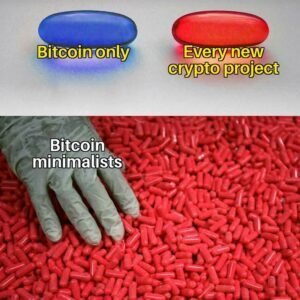If you’re reading this article, you should know what Bitcoin is. Most people have also heard of NFTs. It’s hard to avoide NFTs when every brand seems to be jumping on the NFT bandwagon. But fewer people understand how they’re related and how they’re different. The average person probably doesn’t know that most NFTs exist on Ethereum and how that’s different from Bitcoin or the argument about the value of both.
…but some people know! And those people are Bitcoin maximalists.
What is Bitcoin maximalism?
So, who are these people who believe in Bitcoin maximalism and what do they think? I’m glad you asked.

One chain to rule them all
The main thrust of the Bitcoin maximalism argument is that Bitcoin is the ultimate digital currency and cannot, nor should be overtaken or challenged by other blockchains in the cryptoverse. Some of the reasons given in this Bitcoin versus crypto debate are the network effect, public opinion and influence, and the philosophy of cryptography and decentralization.
The network effect that Bitcoin has as the first and most adopted blockchain is important for the continued maintenance and security of the distributed ledger. Bitcoin maxis argue that creating and adopting other blockchains is simply an exercise in creating shitcoins.
Public opinion is important because, with the increase of failed and scam projects, mass adoption can be slowed down. If people think of crypto only as scammers and hacked code, they will not be willing to adopt crypto. Bitcoin’s influence and PR is impacted by altcoins.
Trustlessness and decentralization were some core tenets of Bitcoin pioneers. Satoshi Nakamoto was an advocate of disintermediating money and increasing security for personal information. Bitcoin maxis argue that no other coin upholds these principles like Bitcoin.
In a nutshell, Bitcoin maximalism places the decentralization philosophy driving cryptography and the unique implementation of Bitcoin as more important than the possibilities in new technology that altcoins attempt to bring to fruition.
What is Bitcoin minimalism?
On the other side of the Bitcoin versus crypto debate is Bitcoin minimalism or crypto agnosticism. As you can imagine, they take the opposite stance. They believe in a multichain future and that diversification, even among blockchains, is more true to the crypto philosophy. They argue that Bitcoin maxis are driven by self interest and are short-sighted when it comes to the potential of newer, better technologies.

A multichain future is important in Bitcoin minimalism because placing all eggs in the Bitcoin basket is a recipe for broken eggs. Altcoin fans believe if you’re going to decentralize the money supply and the ledger, why wouldn’t you diversify the number of digital currencies as well?
Technological updates were what drove the creation of Bitcoin. But Bitcoin’s code is already created and it’s extremely difficult to update, so crypto agnostics advocate for creating more new projects to continually improve on protocols and solve scalability problems.
First-mover disadvantage? Just because Bitcoin has the biggest adoption today, doesn’t mean it will in the future. Being the first was an advantage, sure, but it’s not a guarantee—just ask Kodak. Resisting the current of innovation is a good way to lose the market corner.
Bitcoin minimalism tends to view advancing technology as superseding the need to keep Bitcoin untarnished by experimental improvements and new implementations. It places innovation above the core philosophy of maximum security, though not completely excluding it.
Where did the Bitcoin versus crypto debate start?
Back in the early years of Bitcoin, the crypto community was small. It was composed of tech savvy decentralization advocates and developers who were interested in the ideas that Bitcoin was founded on. One of those developers was Vitalik Buterin who developed Ethereum in 2014. He wanted to expand the possibilities of blockchain with a chain that could facilitate smart contracts. Though he was, himself, a supporter of Bitcoin and the philosophy of decentralization, he was met with a surprising resistance to his new Ethereum project.
He coined the term Bitcoin maximalism, referring to critics of altcoins and, specifically, Ethereum. Vitalik wrote about his reasons for believing new protocols would benefit the cryptosphere and, even though he used Bitcoin maximalism as a pejorative, his critics soon adopted the moniker willingly.
Ethereum has become the second biggest layer 1 protocol and dominates DeFi and tokenization, despite the early critics who thought it wouldn’t amount to anything. But, Bitcoin maxis still hold their position in the Bitcoin versus crypto debate. Only time will tell who is proven right in the long run.
What it takes to be a Bitcoin maximalist
You may be asking yourself whether you’re with the Bitcoin maxis or with the crypto agnostics. If you’re already holding any altcoins (or NFTs), chances are you’re not a hardcore maxi. But there are some ways to view the debate that may help you decide which side you land on.
Bitcoin maximalism |
Bitcoin minimalism |
| Decentralization means a blockchain that cannot be compromised by a single source of power—the only blockchain with those fundamentals is Bitcoin | Decentralization means not allowing market share to be concentrated on a single chain, including Bitcoin. The more options there are, the more decentralized crypto is |
| If people begin adopting other cryptocurrencies, the network effect of Bitcoin will be reduced, thus weakening the security and value of the network | With more diversified options, there are more reasons for people to adopt crypto as a concept. Overall crypto adoption can overpower a single chain’s network effect |
| Bitcoin cannot be regulated by the government as a security, other coins can and have been, damaging the cause of Bitcoin | Ethereum has not been considered a security by the SEC but now the SEC appears to be waffling on their stance. Even if some crypto assets are, a little bit of regulatory clarity could help move the ecosystem forward |
| Bitcoin has a fixed supply of 21 million, making it inflation-resistant, unlike most other altcoins | Most altcoins don’t have the supply limits that Bitcoin has but then, most altcoins don’t have the same purpose as a store of value |
| Bitcoin can solve scalability issues with layer 2 solutions like the Lightning Network | You don’t need bridges and workarounds with natively interoperable blockchains |
| There are lots of failed altcoins and rug pull scams that only damage crypto instead of helping it | There were several failed digital currencies before Bitcoin. Part of innovation is allowing experimentation to identify the best solutions |
| Only Bitcoin has solid fundamentals like true trustlessness, decentralization, fixed supply, and transparency | Only Bitcoin is trying to be Bitcoin. Altcoins have other goals and purposes that don’t need the same fundamentals |
There are, of course, many arguments for each side of the Bitcoin versus crypto debate. Depending on who you ask, the cornerstone question underlying the debate can be very different. Some people even argue that the whole debate is moot because both Bitcoin maxis and crypto agnostics disagree on why it’s a debate to begin with. In fact, you could be a Bitcoin maximalist when it comes to “hodling” BTC as your one and only middle finger to fiat currency while also hoping other cryptocurrencies will push crypto technology to new horizons.
What's next for Web3?
What do you think? Are you a Bitcoin maximalist, a crypto agnostic, or somewhere in the middle? If you believe in the philosophy of democratizing money and wresting the trust monopoly away from central banks and government, you might feel at home in Bitcoin maximalism.
On the other hand, perhaps you think Vitalik and the rest of the cryptosphere are right to be pushing the limits of what technology can do for the future of digital finances and information.


